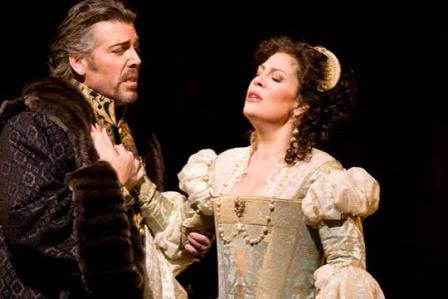I've only sat through Così once, and it was at my college. For some reason the Lyric Opera doesn't like doing it. Oh wait, I know why — because it's ridiculously long for its cast size and plot line.
Think about it. Big, hugely long movies have enormous casts and intricate plot lines and varied settings. They hold our interest. Can you imagine Independence Day with six people and it all taking place at Jeff Goldblum's house? No, because it would suck. Even on the operatic front, Wagner was like "oh damn, this Ring thing is gonna be kind of long. I better add in some dragons and giants and shit." And Così isn't even a drama. It's a comedy. There's a 90 minute rule for comedic films, which I think should be adapted to 150 minutes for comedic operas. Anything over that needs to be severely trimmed down.
Maybe some blog-stumbler is unaware of the plot of Così, the full title of which, by the way, is usually translated as 'All women are like that.' Really starting things out with a bang there, Mozart. Ok, here's the plot:
Dude 1 and Dude 2 brag to their kind of obnoxious, smug friend that there's no way their girlfriends would ever cheat on them. Smug Friend says "Yeah, well I'll bet they would." Dudes 1 and 2 make a bet with him that they'll dress up as Turks or something and try to seduce their girlfriends and the girlfriends won't cheat on them...with themselves. There was a Futurama episode kind of like this (Bendless Love) except it was 22 minutes long and awesome.
Anyway, the girlfriends are kind of resistant at first, but they finally give in and agree to marry them. In the middle of the wedding, their new Turkish boyfriends say something like "oh, whoa, sorry, we gotta check on something — we'll be right back." Then they remove their fake mustaches or whatever the director's decided to use to portray them as residents of the Ottoman Empire, and return as the original boyfriends. Smug Friend, who's been around the whole time, tells them their girlfriends were about to get married to two Turkish gentlemen, the men fake outrage, then they leave AGAIN and come back wearing part of their costumes from before. The girlfriends finally clue into what's been happening and everyone forgives each other.
Basically it's a horrible opera.
The only thing redeemable about it is the music, and that goes on for way too long. You have one of the characters sing an aria, then there's a duet, then then another aria, then a quartet, then another duet, etc. Keep in mind that in opera, when one of these things happens, it almost always freezes the action of the plot. Imagine you're reading a novel and it's supposed to be kind of fun and light, but every time a new thing happens, there're five internal monologues by the characters, each of which takes two or three pages. That's what Così is like. You go in expecting something snappy like Barber of Seville, but in the first 20 minutes you realize you were horribly wrong, and unless you wimp out and leave at intermission, the next three hours of your life will be spent watching something that could easily be accomplished in an hour and a half.
My theory about this opera is Mozart was dealing with 18th century opera singers, who, even compared to singers today, had an extremely inflated sense of self-worth. Mainly because opera singers were treated like rock stars back in the day, and more people than 70-year-olds and other opera singers knew who they were. So basically, he might've had a nice short thing in mind — I mean, The Impresario is delightfully short, so you know he could do it — and then after he wrote an aria for someone, one of the other singers said "Hey! If they get one, I get one." And it just kind of escalated. And I mean, I've seen Amadeus, which I assume to be completely accurate, so I know how easy it was for Mozart to write music.
Hey, there's another theory. Maybe Salieri was leaning over his shoulder like some tempting demon saying "The audience will stand one more trio....just add it in...they have nothing better to do. It's the 18th century; what're they gonna need to do? Wash their horse? They can wash their horse tomorrow. Tonight they hear this trio. And add another aria for Whatsherface. She looked grouchy yesterday."
There's also a saucy maid in it, but I hate saucy maids, so I have elected to drop her from the plot.
My recommendation for this opera is to get a recording of it and skip seeing it live. The only thing it has going for it is beautiful music, and if you're listening to a recording, you can always pause it and watch tv in between the endless ensembles.
But you know, maybe there's a way it could be staged to keep it interesting. If you have an awesome setting it could be moved to instead of an 18th century parlor, do let me know.


